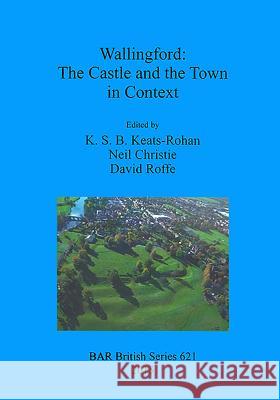Wallingford: The Castle and the Town in Context » książka
Wallingford: The Castle and the Town in Context
ISBN-13: 9781407314181 / Angielski / Miękka / 2015 / 302 str.
Medieval castles are, as Professor Liddiard states in his Foreword to this volume, 'evocative monuments and perhaps more than any other building capture the ideals of the Middle Ages.' This idealization and romanticism of castles, however, can often obscure their histories as functioning dwellings, fortresses, and political and social centres. Wallingford Castle in Oxfordshire is a prime example of a structure with a rich history. Its importance lies in its strategic position on the Thames, allowing it to serve as a vital stronghold during conflicts and a royal residence in more peaceful times. This volume is a product of the Wallingford Burh to Borough Research Project (2008-2010), a collaborative project between the Universities of Leicester, Exeter and Oxford. It contains reports of excavations undertaken at the castle and its town, excavated between the 1960s and today. The results of the archaeological investigations are contextualized using contemporary documents and accounts of the castle, such as surveys and rent agreements. Combining the text and material evidence, the contributions to this volume provide a detailed narrative of the history of the site from its construction to its destruction, as well as helpful contextual sections on English history and medieval castles. Also included are sections on excavations at the castle at the nearby town of Oxford and the priory at Wallingford. The text is accompanied by colour photographs, drawings, plans, maps, and transcripts of the Medieval and Tudor documents. This volume accompanies 'The Origins of the Borough of Wallingford: Archaeological and historical perspectives', edited by K. S. B. Keats-Rohan and D. R. Roffe in 2009, (BAR 494), and 'Transforming Townscapes: From burh to borough: the archaeology of Wallingford, AD 800-1400' edited by N. Christie and O. H. Creighton in 2013 published by the Society for Medieval Archaeology.
Medieval castles are, as Professor Liddiard states in his Foreword to this volume, 'evocative monuments and perhaps more than any other building capture the ideals of the Middle Ages.' This idealization and romanticism of castles, however, can often obscure their histories as functioning dwellings, fortresses, and political and social centres. Wallingford Castle in Oxfordshire is a prime example of a structure with a rich history. Its importance lies in its strategic position on the Thames, allowing it to serve as a vital stronghold during conflicts and a royal residence in more peaceful times. This volume is a product of the Wallingford Burh to Borough Research Project (2008-2010), a collaborative project between the Universities of Leicester, Exeter and Oxford. It contains reports of excavations undertaken at the castle and its town, excavated between the 1960s and today. The results of the archaeological investigations are contextualized using contemporary documents and accounts of the castle, such as surveys and rent agreements. Combining the text and material evidence, the contributions to this volume provide a detailed narrative of the history of the site from its construction to its destruction, as well as helpful contextual sections on English history and medieval castles. Also included are sections on excavations at the castle at the nearby town of Oxford and the priory at Wallingford. The text is accompanied by colour photographs, drawings, plans, maps, and transcripts of the Medieval and Tudor documents. This volume accompanies 'The Origins of the Borough of Wallingford: Archaeological and historical perspectives', edited by K. S. B. Keats-Rohan and D. R. Roffe in 2009, (BAR 494), and 'Transforming Townscapes: From burh to borough: the archaeology of Wallingford, AD 800-1400' edited by N. Christie and O. H. Creighton in 2013 published by the Society for Medieval Archaeology.











